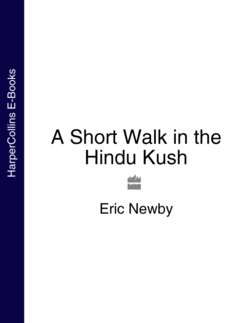Читать книгу A Short Walk in the Hindu Kush - Eric Newby - Страница 7
Preface
ОглавлениеMr Eric Newby must not be confused with the other English writer of the same surname. I began reading A Short Walk in the Hindu Kush in the belief that it was the work of his namesake, whom I have long relished. I found something equally delightful but quite different.
Mr Eric Newby, I have since learned, is the author of an exciting sea-log, The Last Grain Race, an account of how at the age of eighteen he signed on as an apprentice of the Finnish barque Moshulu, lived in the fo’c’sle as the only Englishman, worked the ship, rounded both capes under sail in all the vicissitudes of the historic and now extinct passage from Australia to the United Kingdom of the grain-carrying windjammers. His career in the army was heroic and romantic. The bravado and endurance which had briefly made him a sailor were turned to the King’s service. After the war he went into the most improbable of trades, haute couture. It would strain the imagination to picture this stalwart young adventurer selling women’s clothes. We are relieved of the difficulty by his own deliciously funny description, which immediately captivates the reader of the opening chapters of A Short Walk. One can only use the absurdly trite phrase ‘the call of the wild’ to describe the peculiar impetus which carried Mr Newby from Mayfair to the wild mountains of Afghanistan. He was no sailor when he embarked in the Moshulu; he was no mountaineer when he decided to climb the Hindu Kush. A few days scrambling on the rocks in Wales, enchantingly chronicled here, were his sole preparation. It was not mountaineering that attracted him; the Alps abound in opportunities for every exertion of that kind. It was the longing, romantic, reasonless, which lies deep in the hearts of most Englishmen, to shun the celebrated spectacles of the tourist and without any concern with science or politics or commerce, simply to set their feet where few civilized feet have trod.
An American critic who read the manuscript of this book condemned it as ‘too English’. It is intensely English, despite the fact that most of its action takes place in wildly foreign places and that it is written in an idiomatic, uncalculated manner the very antithesis of ‘Mandarin’ stylishness. It rejoices the heart of fellow Englishmen, and should at least illuminate those who have any curiosity about the odd character of our Kingdom. It exemplifies the essential traditional (some, not I, will say deplorable) amateurism of the English. For more than two hundred years now Englishmen have been wandering about the world for their amusement, suspect everywhere as government agents, to the great embarrassment of our officials. The Scotch endured great hardships in the cause of commerce; the French in the cause of either power or evangelism. The English only have half (and wholly) killed themselves in order to get away from England. Mr Newby is the latest, but, I pray, not the last, of a whimsical tradition. And in his writing he has all the marks of his not entirely absurd antecedents. The understatement, the self-ridicule, the delight in the foreignness of foreigners, the complete denial of any attempt to enlist the sympathies of his readers in the hardships he has capriciously invited; finally in his formal self-effacement in the presence of the specialist (with the essential reserve of unexpressed self-respect) which concludes, almost too abruptly, this beguiling narrative – in all these qualities Mr Newby has delighted the heart of a man whose travelling days are done and who sees, all too often, his countrymen represented abroad by other, new and (dammit) lower types.
Dear reader, if you have any softness left for the idiosyncrasies of our rough island race, fall to and enjoy this characteristic artifact.
EVELYN WAUGH
1959
